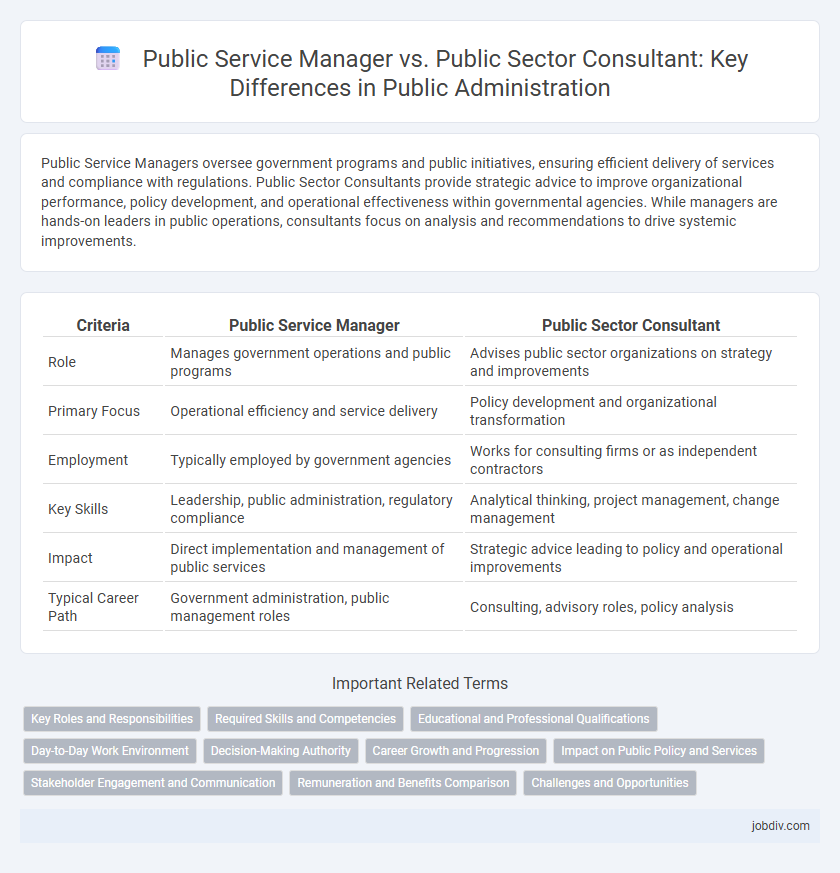Public Service Managers oversee government programs and public initiatives, ensuring efficient delivery of services and compliance with regulations. Public Sector Consultants provide strategic advice to improve organizational performance, policy development, and operational effectiveness within governmental agencies. While managers are hands-on leaders in public operations, consultants focus on analysis and recommendations to drive systemic improvements.
Table of Comparison
| Criteria | Public Service Manager | Public Sector Consultant |
|---|---|---|
| Role | Manages government operations and public programs | Advises public sector organizations on strategy and improvements |
| Primary Focus | Operational efficiency and service delivery | Policy development and organizational transformation |
| Employment | Typically employed by government agencies | Works for consulting firms or as independent contractors |
| Key Skills | Leadership, public administration, regulatory compliance | Analytical thinking, project management, change management |
| Impact | Direct implementation and management of public services | Strategic advice leading to policy and operational improvements |
| Typical Career Path | Government administration, public management roles | Consulting, advisory roles, policy analysis |
Key Roles and Responsibilities
Public Service Managers oversee the implementation of government policies, coordinate departmental activities, and ensure efficient delivery of public programs to meet community needs. Public Sector Consultants provide expert advice on organizational strategy, policy development, and process improvement to enhance public sector performance and compliance. Both roles require strong analytical skills and knowledge of public administration, but managers focus on operational leadership while consultants emphasize advisory and project-based interventions.
Required Skills and Competencies
Public Service Managers require strong leadership, strategic planning, and effective communication skills to oversee government operations and ensure public welfare. Public Sector Consultants need expertise in data analysis, problem-solving, and change management to advise organizations on improving policies and efficiency. Both roles demand a deep understanding of public administration, regulatory frameworks, and stakeholder engagement.
Educational and Professional Qualifications
Public Service Managers typically hold a bachelor's or master's degree in public administration, public policy, or related fields, often complemented by certifications like Certified Public Manager (CPM). Public Sector Consultants usually possess advanced degrees such as an MBA or a master's in public policy, along with specialized training in data analysis, strategic planning, or sector-specific expertise. Both roles value professional experience in government or non-profit organizations, with consultants often requiring demonstrated proficiency in project management and advisory skills.
Day-to-Day Work Environment
Public Service Managers oversee government agency operations, ensuring compliance with policies and managing staff to achieve public service goals, often working in office settings with frequent interactions with stakeholders. Public Sector Consultants focus on analyzing organizational challenges, advising on strategic improvements, and implementing solutions, typically balancing office work with client site visits and collaborative workshops. Both roles emphasize teamwork and problem-solving but differ in direct managerial responsibilities versus advisory functions.
Decision-Making Authority
Public Service Managers possess direct decision-making authority, overseeing the implementation of policies and managing operational functions within government agencies. Public Sector Consultants provide expert advice and strategic recommendations but typically lack formal authority to enforce decisions. Their influence is advisory, supporting executives and managers in shaping public sector initiatives rather than controlling daily operations.
Career Growth and Progression
Public Service Managers oversee government programs and lead teams to implement policies, offering steady career growth through promotions into senior management or executive roles. Public Sector Consultants provide specialized advice on improving public organization efficiency and strategy, with career progression linked to expertise development and transitioning into advisory or leadership positions across multiple agencies. Both career paths offer opportunities for professional advancement, but Public Service Managers tend to have more structured progression within government hierarchies, while Consultants experience broader industry engagement and project diversity.
Impact on Public Policy and Services
Public Service Managers directly influence the implementation and effectiveness of public policies by overseeing government programs and ensuring compliance with regulations, thereby driving tangible improvements in public services. Public Sector Consultants provide expert analysis and strategic recommendations that shape policy decisions and optimize service delivery, offering evidence-based solutions to complex governmental challenges. Both roles critically impact public policy, with managers focusing on execution and consultants on advisory, resulting in enhanced governance and community outcomes.
Stakeholder Engagement and Communication
Public Service Managers specialize in direct stakeholder engagement, utilizing strategic communication to align public service objectives with community needs and government mandates. Public Sector Consultants emphasize advisory roles, leveraging data-driven communication techniques to influence policy decisions and optimize stakeholder collaboration. Both roles require advanced interpersonal skills to effectively manage diverse stakeholder interests and ensure transparent, impactful communication within the public sector.
Remuneration and Benefits Comparison
Public Service Managers typically earn a median salary ranging from $75,000 to $110,000 annually, with benefits including pension plans, health insurance, and job stability linked to government employment. Public Sector Consultants often command higher compensation, averaging between $90,000 and $130,000, reflecting project-based roles with performance bonuses and flexible work arrangements but usually fewer traditional government benefits. The choice between these roles hinges on preferences for steady government benefits versus higher potential earnings and variable incentives in consulting.
Challenges and Opportunities
Public Service Managers face challenges such as navigating complex regulatory environments and managing limited budgets while ensuring efficient service delivery, creating opportunities to implement innovative policies that improve community outcomes. Public Sector Consultants encounter obstacles in aligning diverse stakeholder interests and driving organizational change, presenting chances to leverage expertise for strategic transformation and capacity building within government agencies. Both roles offer unique opportunities to influence public administration, though they require distinct approaches to overcoming systemic challenges and fostering sustainable development.
Public Service Manager vs Public Sector Consultant Infographic

 jobdiv.com
jobdiv.com